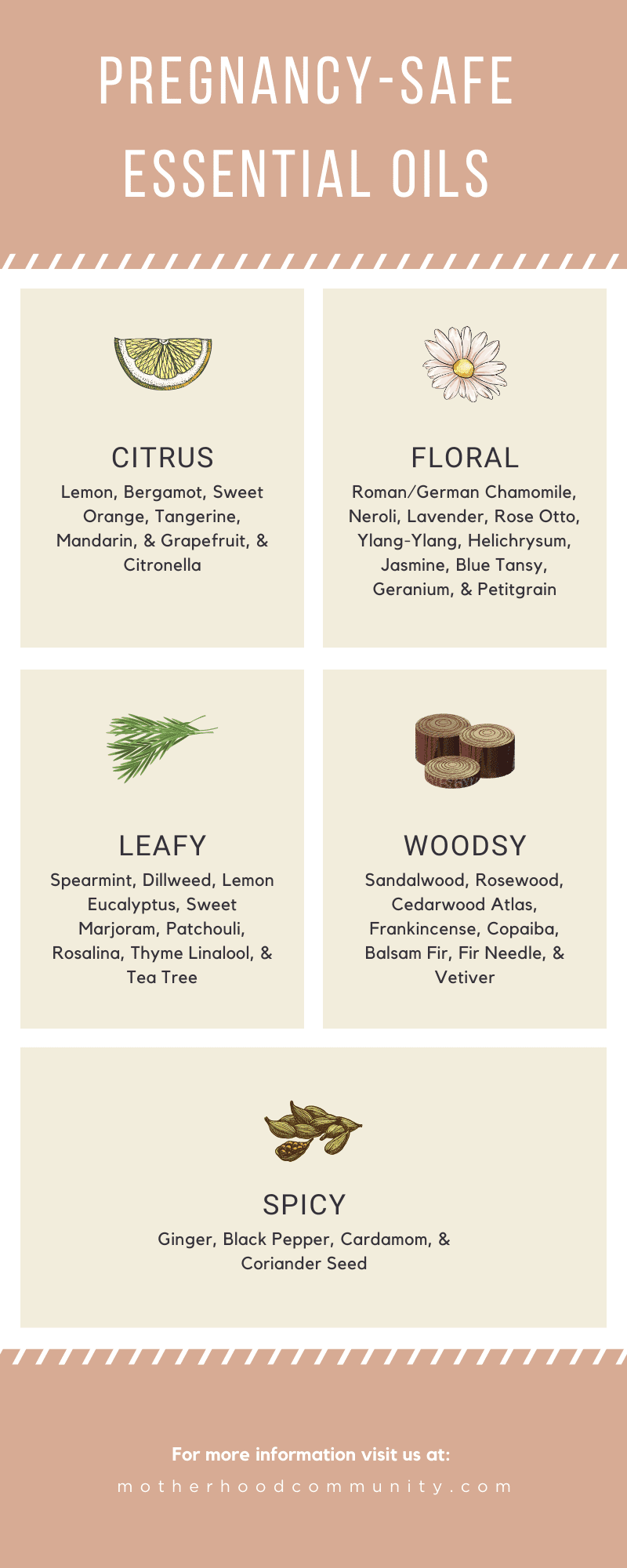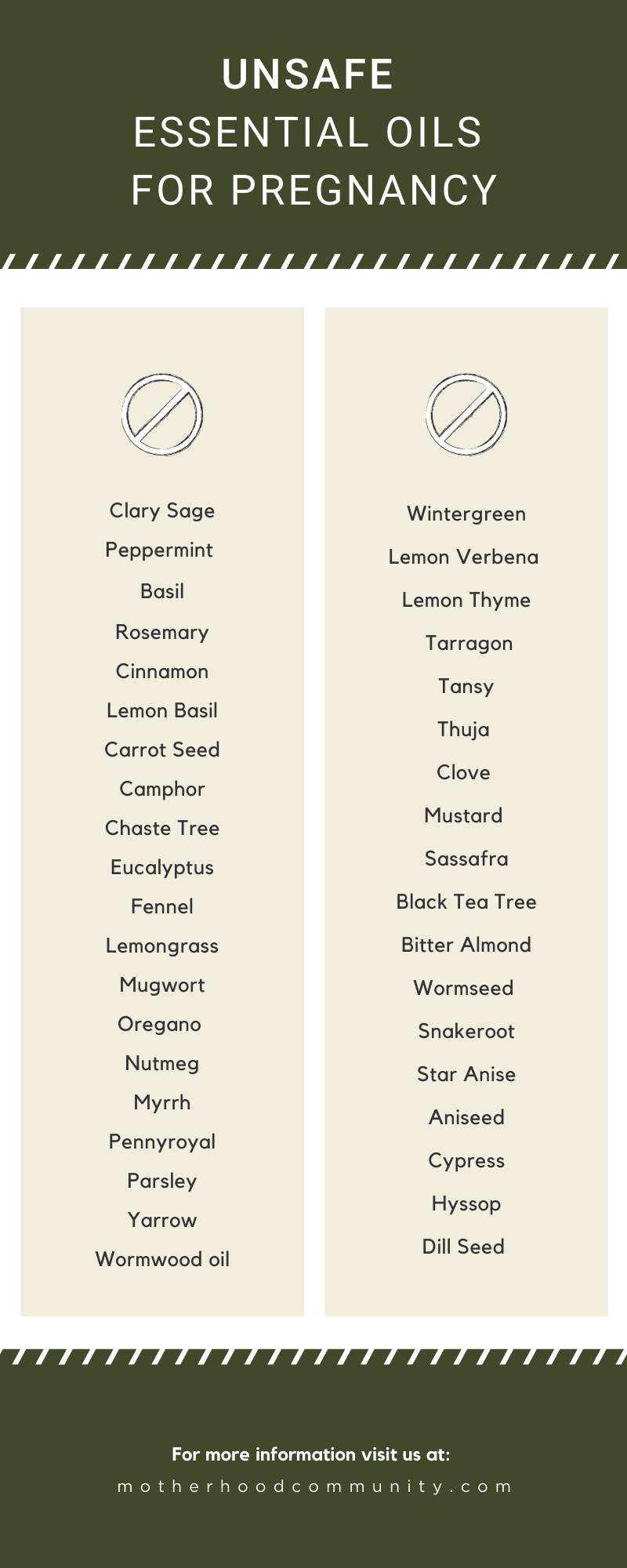Overview
Essential oils and aromatherapy have gained popularity in recent years as effective medicinal and home remedies for various physical and mental ailments.
When used safely and mindfully, these oils can enhance our health and well-being.
Because they’re very potent and concentrated, it’s essential to proceed with caution if you’re pregnant or breastfeeding.
We’ve compiled a comprehensive list of safe and unsafe essential oils for pregnancy for you.
What are essential oils?
Essential oils (EOs) are highly concentrated plant extracts from various sources such as tree bark and resin, plant leaves, stems, roots, flowers, nuts, seeds, and even fruit.
The benefits of essential oils are thanks to an abundant amount of healing and medicinal compounds known to support the body’s healing processes.
The use of essential oils goes back hundreds of years across many different cultures and healing disciplines like Traditional Chinese Medicine and Ayurveda.
Do essential oils really work?
Many EOs can be particularly useful at naturally treating multiple health conditions and symptoms – including many common pregnancy ailments.
Some research and anecdotal evidence shows that EOs can be effective at:
- Boosting immunity
- Decreasing stress and anxiety
- Nausea & morning sickness
- Constipation relief
- Heartburn relief
- Relieving pain and discomfort
- Diabetes and blood sugar balance
- Better sleep & rest
- Muscle aches and joint pain relief
- Combatting hair loss
- Treating dandruff and scalp issues
- Headaches & migraine relief
- Yeast Infections
- Treating hemorrhoids
- Varicose veins
- Weight-loss and craving reduction support
- Decreasing inflammation
- More energy & mental focus
- Dark spots & skin brightening
- Improved blood circulation
- Boosting mood, relaxation, and mental well-being
- Soothing eczema and other skin conditions
- Treating colds, coughs, sinus infections, and sore throats
- Addressing allergy symptoms
That being said, the same EO can have different effects on different people.
And some people may find that EOs don’t work as well for them.
We all have different and unique biochemical makeup, which means that what may work for you won’t necessarily work for me.
For example, lavender essential oil is a calmative for many people though it can also act as a stimulant.
You’ll have to find your unique EO path by testing to see what you resonate with and what you don’t.
Safe Use of Essential Oils During Pregnancy
- Most experts agree that EOs should be avoided during the first trimester. (This is especially true if you’re a high-risk pregnancy, have a higher chance of miscarriage, or have had previous miscarriages.)
- Avoid internal use of essential oils. (Always consult with your OB-GYN, health care provider, midwife, and aromatherapist before ingesting any EOs.)
- You may use pregnancy-safe EOs in moderation during the second and third trimesters.
- Check with your pediatrician and OB-GYN about postpartum use of essential oils.
- EOs are potent, and especially in pregnancy, a little goes a long way. Don’t overdo it, not even with a diffuser.
- Always heavily dilute your EOs in a carrier oil like coconut oil – stick to no more than 8 drops of safe EOs per 1 ounce (or 2 tbsp) of carrier oil.
- Always use certified organic, 100% therapeutic grade essential oils. (This will reduce your risk of potentially absorbing harmful chemicals like pesticides, toxins, and dilution agents.)
- If you experience any adverse reaction or skin irritation to an oil stop using it immediately.
- Avoid using EOs daily. Stick to an as-needed, minimalist approach throughout your pregnancy.
- Pregnant women have an enhanced sense of smell and can be extra sensitive to aromatics and overexposure. (Don’t run your diffuser for an hour or hours – stick to 15-20 minutes at a time, maximum.
- Certain EOs like citrus oils have a phototoxic effect – they can cause skin rashes, dark spots, and irritation after sun exposure. Avoid phototoxic oils 18-24 hours prior to sun exposure.)
Pregnancy-Safe Essential Oils
The following are the best essential oils to use during pregnancy.
However, if you experience any adverse reaction or irritation to any oil, discontinue use immediately.
Citrus
- Lemon oil
- Bergamot oil
- Sweet orange oil
- Tangerine oil
- Mandarin oil
- Grapefruit oil
- Citronella oil
Floral
- Roman chamomile oil
- German chamomile oil
- Neroli oil
- Lavender oil
- Rose otto oil
- Ylang-ylang oil
- Helichrysum oil
- Jasmine oil
- Blue tansy oil
- Geranium oil
- Petitgrain oil
Spicy
- Ginger oil
- Black pepper oil
- Cardamom oil
- Coriander seed oil
Woodsy
- Sandalwood oil
- Rosewood oil
- Cedarwood Atlas oil
- Frankincense oil
- Copaiba oil
- Balsam fir oil
- Fir needle oil
- Vetiver oil
Leafy
- Spearmint oil
- Dill weed oil
- Lemon eucalyptus oil
- Sweet marjoram oil
- Patchouli oil
- Rosalina oil
- Thyme linalool oil
- Tea tree oil
Unsafe Essential Oils To Avoid
- Clary Sage oil
- Peppermint oil
- Basil oil
- Rosemary oil
- Cinnamon oil
- Lemon Basil oil
- Carrot Seed oil
- Camphor oil
- Chaste Tree oil
- Eucalyptus oil
- Fennel oil
- Lemongrass oil
- Mugwort oil
- Oregano oil
- Nutmeg oil
- Myrrh oil
- Pennyroyal oil
- Parsley oil
- Yarrow oil
- Wormwood oil
- Wintergreen oil
- Lemon Verbena oil
- Lemon Thyme oil
- Tarragon oil
- Tansy oil
- Thuja oil
- Clove oil
- Mustard oil
- Sassafras oil
- Black Tea Tree oil
- Bitter Almond oil
- Wormseed oil
- Snakeroot oil
- Star Anise oil
- Aniseed oil
- Cypress oil
- Hyssop oil
- Dill Seed oil














